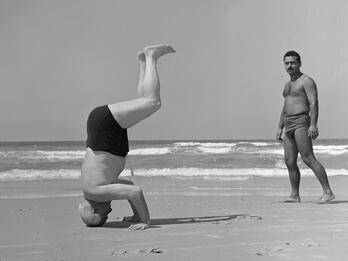The Eastern European Era in Jewish History
Abraham Joshua Heschel
1945
We Jews, the first nation in the world that began not only to mark but also to appraise and to judge the generations, evaluate eras on the basis of different criteria, namely, how much refinement is there in the life of a people, how much spiritual substance in its workaday existence, i.e., how much metaphysics in its material aspect? To us culture…
Engage with this Source

Related Guide
Destruction, Rebirth, and Cultural Thought
1939–1973
The years between 1939 and 1973 witnessed unprecedented tragedy and transformation for the Jewish people.
Restricted
Related Guide
The Holocaust: Years of Catastrophe
1939–1945
Jewish writing in Nazi-occupied areas documented ghetto life, moral questions, and Jewish identity, while writers in free zones grappled with the unfolding tragedy.
Creator Bio
Abraham Joshua Heschel
1907–1972
Rabbi, theologian, philosopher, poet, and social activist Abraham Joshua Heschel was born in Warsaw, a descendant of two prominent Hasidic families. Following Orthodox rabbinic ordination, he moved to Berlin, where he studied philosophy at the university and enrolled at the Hochschule für die Wissenschaft des Judentums (Higher Institute for Jewish Learning). Heschel obtained his doctorate at the University of Berlin in 1934 and went on to teach at the Jüdisches Lehrhaus (Jewish House of Learning) in Frankfurt, where he succeeded the philosopher Martin Buber as director. Heschel remained in Germany until 1938, when he was arrested by the Gestapo and deported to Poland. In 1939, he found refuge in England and in 1940, through the intervention of Hebrew Union College in Cincinnati, obtained a visa to the United States. Heschel taught philosophy and rabbinics for five years at Hebrew Union College, and then spent the remainder of his career at the Jewish Theological Seminary of America in New York, where he was professor of Jewish ethics and mysticism. He was one of the most widely read philosophers of religion in the United States, his work known in both Jewish and Christian circles. He also played a prominent role in the civil rights and peace movements in the United States in the 1960s, most notably marching alongside Martin Luther King, Jr. in the Selma to Montgomery protest march in 1965.
You may also like
On Disbelieving Atrocities
We, the screamers, have been at it now for about ten years. We started on the night when the epileptic van der Lubbe set fire to the German Parliament; we said that if you don’t quench those flames at…
The Situation of the Jewish Writer
All discussions pertaining to the Jews must begin with some very gloomy observations. The Jews are, everywhere, a minority group, and it is a particular misfortune these days to be a minority group in…
Reflections on Modern Jewish Studies
In my opinion, one cannot understand the development of the Science of Judaism except by taking note of the profound contradictions or, if you will, the unique dialectical tensions present within it…
An Act of Affirmation
It is traditional to begin a new magazine with brave declarations. If we do not, we trust we shall be forgiven.
We begin at a moment heavy with a sense of human destiny. Every schoolboy who listens to…
The Nazi Crematorium in the Movie Houses of Buenos Aires
For some days past, newsreels about the concentration camps have been showing in the movie theaters of Buenos Aires. The public can now easily observe the methods used by the Germans in the death…
The Universalism of the Chosen People
In what sense is Judaism racist? Does it in general recognize the “holiness” of race and if so, what practical deductions have Jews made from such a theory?
In connection with the Nazi racist…


